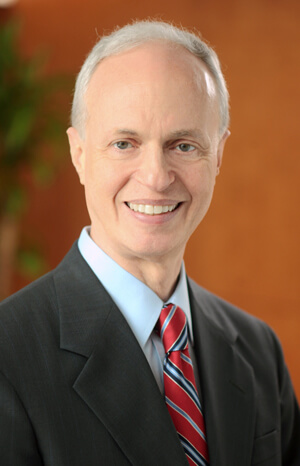
2013 Legacy Award: Larry Schneider (Arnold & Porter)
by Aleta Sprague
“Don’t sit back. Step up, take a case – just do it.”
So advised Larry Schneider, when I asked him for a few words of wisdom for new attorneys seeking to get involved with pro bono practice. And he should know. The winner of our first-ever Legacy Award, Larry has made pro bono work a priority throughout his career, providing both direct services to low-income clients and leading the way in crafting policy reforms to improve the nation’s immigration system.
Larry’s commitment to pro bono work emerged in law school, during which he represented clients in both civil and criminal matters through the law school’s clinics and spent a summer working at a legal services organization. Upon graduation, he joined Arnold & Porter, inspired in part by the firm’s established commitment to public service; according to longstanding policy, the firm urged each attorney to devote 15% of his or her time to pro bono matters. Larry joined the firm’s Pro Bono Committee early in his career and also took on a series of leadership positions with the Washington Council of Lawyers, including a term as president in 1983–1984.
A pivotal moment in Larry’s pro bono career was the passage of the Immigration Control and Reform Act in 1986, while Larry was serving as Chair of the DC Bar Public Service Activities Committee (now the Pro Bono Committee). Larry recognized that many individuals in DC would newly qualify for citizenship under the Act, but that there was insufficient capacity to accommodate all their legal needs. So Larry began organizing a pro bono effort among area law firms, and got Arnold and Porter to partner with Ayuda and the Washington Lawyers’ Committee. Through this collaboration, volunteer attorneys were able to both serve clients through clinics and identify and address policy issues.
Since then, Larry has led Arnold and Porter’s pro bono immigration efforts. One of the most challenging aspects of the work has been coping with deficiencies within the immigration system itself – for example, due to inadequate resources, there are often significant delays in cases being set for hearings. This challenge, however, has also created an opportunity.
One of Larry’s most significant projects in recent years involved evaluating the entire U.S. deportation system and providing recommendations for reform. The project, an effort of over fifty Arnold and Porter attorneys, culminated in alengthy report analyzing all aspects of the deportation process and providing sixty policy recommendations for both administrative and legislative action. While Congress has yet to act on the legislative recommendations, a number of administrative changes have been put in place as a result of the report. The policy recommendations themselves, which were endorsed by the ABA, emerged from issues that pro bono attorneys were observing in their cases. The report provided an opportunity to address these issues more systemically.
Larry noted that working on pro bono matters as a team helps tremendously in enabling attorneys to balance pro bono work with the rest of their practice – though ultimately, “if you want to do something, you can make time for it.” At Arnold and Porter, for example, two attorneys, along with an associate mentor and a supervising partner, are assigned to each asylum case. This model provides both flexibility and sufficient support to enable new attorneys to feel comfortable getting involved and taking on cases.
Larry is an ideal recipient of our inaugural Legacy Award. In addition to his commitment to pro bono work in the DC area, he has been a Washington Council of Lawyers member for over 35 years. Larry served as our president from 1984–85, and has been one of our most trusted advisors, as well as a wonderful mentor to our future leaders. We are pleased to recognize Larry’s exceptional contributions to both pro bono work and the Washington Council of Lawyers.
Don’t miss our 2013 Awards Reception to learn more about Larry and this year’s other award winners!






